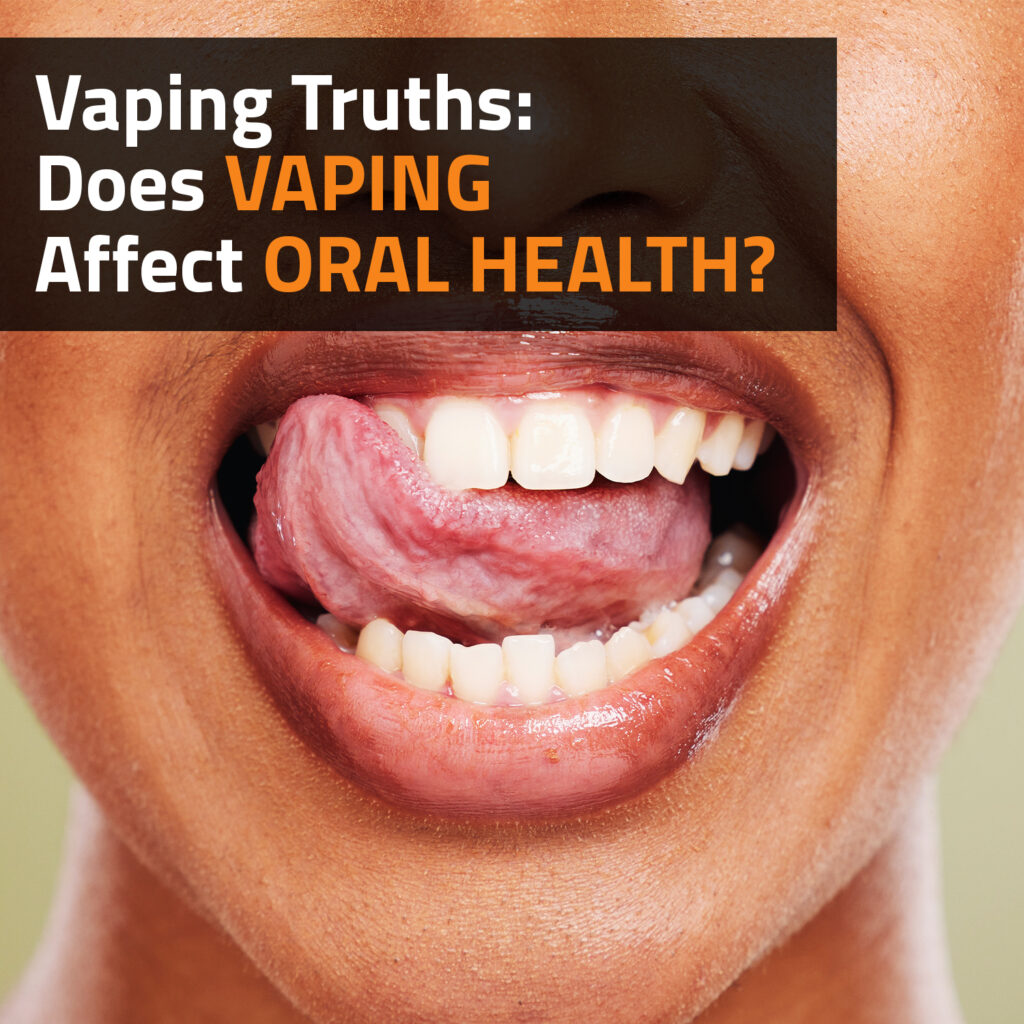Vaping has grown in popularity over the past decade as a less harmful alternative to smoking. While it eliminates many of the harmful chemicals found in traditional cigarettes, there are still concerns about its impact on overall health – including oral health. Understanding how vaping affects the mouth, teeth, and gums is an important consideration for vapers. This article explores the scientific truths about vaping’s effects on oral health, separating fact from fiction.
How Vaping Works: E-Liquid Ingredients
To understand vaping’s impact on oral health, it is important to understand what it is and what substances are involved. Vaping devices heat a liquid – commonly referred to as e-liquid or vape juice – to produce inhalable vapour. The primary ingredients in e-liquids include:
- Propylene Glycol (PG) – A common food additive that absorbs moisture and can contribute to dry mouth.
- Vegetable Glycerin (VG) – A thickening agent that adds vapour density and sweetness, potentially encouraging bacterial growth.
- Nicotine – A stimulant known to reduce blood flow, impair gum healing, and potentially contribute to oral tissue damage.
- Flavourings and additives – Some flavouring agents may be acidic or irritating to the soft tissues in the mouth.
Recommended products
The Effects Of Vaping On Oral Health
Vaping and its effects on oral health differs for each individual. Some vapers may never experience any oral health issues, while others may be more susceptible to its effects on oral health. Some of the potential oral health issues linked to vaping include:
- Dry mouth (xerostomia)
- Increased risk of cavities
- Gum inflammation
- Bad breath (halitosis)
Dry Mouth (Xerostomia)
Propylene glycol (PG), one of the main ingredients in e-liquids, is hygroscopic. This means it absorbs moisture and can lead to dry mouth, a condition that reduces saliva production. Since saliva is essential for neutralising acids, washing away food particles, and preventing bacterial growth, a lack of it may increase the risk of bad breath and gum disease.
Increased Risk Of Cavities
The vegetable glycerin (VG) in vape liquids adds sweetness to the aerosol, which, when combined with flavourings, can stick to the teeth and promote bacterial growth. Additionally, studies suggest that e-liquids containing sweeteners can lower pH levels, leading to an increased risk of cavities.
Gum Inflammation
Nicotine, whether from cigarettes or vaping, has well-documented effects on gum tissue. It restricts blood flow to the gums, reducing their ability to heal and fight infections. Over time, this can contribute to gingivitis (gum inflammation).
Bad Breath (Halitosis)
Dry mouth, bacterial accumulation, and the lingering effects of nicotine can all contribute to bad breath. Without sufficient saliva to flush out bacteria, volatile sulfur compounds (VSCs) build up, leading to persistent halitosis in some vapers.
Temporary Loss Of Taste (Vaper’s Tongue)
Some vapers report experiencing a temporary loss of taste, commonly known as “vaper’s tongue.” This occurs when the taste buds become desensitised due to prolonged exposure to e-liquid flavours. Factors like dehydration, excessive vaping, and dry mouth contribute to this condition. While not a serious health issue, it can be frustrating for vapers who rely on strong flavour profiles. The good news is that vaper’s tongue is usually temporary, and taste sensation often returns after a short break from vaping, increased hydration, and maintaining good oral hygiene
The Role Of Temperature And Inhalation Patterns
Another factor that influences vaping’s impact on oral health is the temperature of vaporised e-liquid and inhalation patterns. Higher temperatures can produce more aerosolised compounds, increasing the likelihood of irritation or tissue damage. Deep, frequent inhalation also exposes the mouth to more prolonged contact with vapour, which may exacerbate negative effects over time.
Comparing Vaping To Traditional Smoking
It is important to acknowledge that vaping is less harmful than smoking traditional cigarettes. Cigarette smoke contains over 7000 chemicals, many of which are directly linked to oral cancer, severe gum disease, and tooth loss. Oral health risks of vaping are much less severe, uncommon, and can be prevented and/or managed.
Long-Term Studies And Emerging Research
Since vaping is a relatively new phenomenon compared to smoking, long-term studies are still in progress. Preliminary research suggests that chronic vapers may experience higher rates of gum inflammation compared to non-vapers.
Tips For Protecting Oral Health While Vaping
For those who choose to vape, there are steps that can help mitigate and manage potential oral health risks:
- Stay hydrated – Drinking plenty of water can help combat dry mouth (the main culprit of oral health issues linked to vaping) and flush out bacteria.
- Practice good oral hygiene – Brushing twice a day, flossing, and using fluoride toothpaste helps protect teeth and gums against bacteria, buildup of VSCs, and fight infections.
- Use a non-alcoholic mouthwash – Alcohol-based mouthwashes can further dry out the mouth; opt for an alcohol-free alternative to keep oral tissues hydrated and bacteria-free.
- Chew sugar-free gum – This stimulates saliva production, which helps protect against cavities, dry mouth, and bad breath.
- Regular dental checkups – Seeing a dentist as recommended (twice a year) can help identify and address potential dental issues before they become serious.
- Choose your e-liquids wisely – Avoid e-liquids with high sugar content, sweeteners and additional additives, or acidic flavourings that may contribute to enamel erosion.
- Moderate usage and temperature control – Avoid high-wattage vaping that produces extremely hot vapour as this may increase oral tissue irritation.
- Take a short break – Taking some time off from vaping or simply vaping less frequently throughout the day can give your mouth and your taste buds a break from e-liquids and vapour, contributing to better oral health and a better flavour experience.
While vaping is a less harmful alternative to smoking, it may have effects on some individuals’ oral health. Issues such as dry mouth, increased cavities, gum inflammation, and oral tissue irritation are concerns that vapers should be aware of. Maintaining good oral hygiene, staying hydrated, and chewing sugar-free gum can help reduce these risks. As research continues, a clearer picture of vaping’s long-term impact on oral health will emerge, allowing both users and health professionals to make informed decisions about its safety. Ultimately, being proactive about oral care can help mitigate potential risks associated with vaping, ensuring better overall dental health and a satisfying vaping experience.








